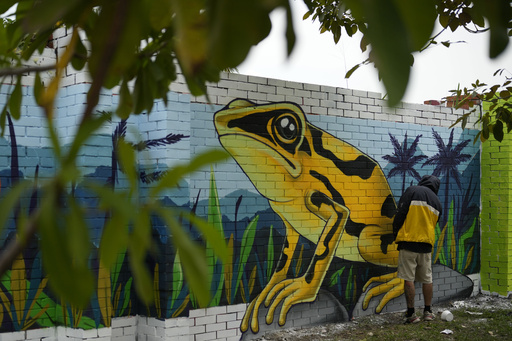
In Cali, Colombia, global leaders focused on environmental issues convene starting Monday to address the alarming decline in biodiversity worldwide and evaluate nations’ promises to safeguard vital plants, animals, and ecosystems. This two-week United Nations Biodiversity Conference, known as COP16, builds on the significant agreements reached during the 2022 meetings in Montreal, where representatives from 196 countries endorsed a landmark treaty aimed at preserving biodiversity.
The treaty outlines 23 key measures intended to halt and even reverse the losses in nature. Among its objectives is a commitment to protect 30% of the earth’s surface and restore 30% of degraded ecosystems by the year 2030. Laura Rico, a campaign director at Avaaz, a prominent global activism group, expressed hopes that COP16 would serve as a motivation for countries to initiate real work. She emphasized the need for effective implementation, monitoring, and compliance strategies that should be tailored to national contexts.
There are significant concerns regarding the ongoing threat to biodiversity. Linda Krueger, who directs biodiversity efforts at The Nature Conservancy, noted that evidence indicates a drastic decrease in the abundance and distribution of various species. She remarked, “Many wild species are losing their habitat and consequently declining in numbers,” adding that rising extinction rates are also a pressing issue. Approximately 1 million species of plants and animals are currently facing the threat of extinction, marking a catastrophic phase for life on Earth.
Particularly in the Amazon rainforest, biodiversity faces multifaceted threats. Andrew Miller, advocacy director at Amazon Watch, cited issues such as agricultural expansion, deforestation, roadway development, wildfires, and drought as critical factors undermining the region’s ecological stability. Miller summarized the situation by saying, “When you consider all these factors, it becomes a genuine threat to biodiversity.”
The World Wildlife Fund (WWF) and the Zoological Society of London recently released a Living Planet report that highlighted a staggering 73% average decline in global wildlife populations over the past 50 years. Alarmingly, the report indicated that Latin America and the Caribbean recorded an average drop of 95% in wildlife numbers.
Indigenous communities play a crucial role in the defense of biodiversity and the battle against climate change, often at great personal risk. Miller points out the vital contribution of Indigenous peoples, asserting that their voices must be amplified during COP16 discussions. According to Rico, Indigenous communities hold essential solutions to the dual crises of climate change and biodiversity loss. “They are the stewards of their lands, employing their governance systems and traditional practices to nurture their surroundings,” she stated, underlining the importance of recognizing and securing Indigenous territories during the conference.
José Mendez, secretary of the National Organization of the Indigenous Peoples of the Amazon, remarked that Indigenous members from the region have been preparing for COP16 for several months. “This conference is a prime opportunity to showcase to international stakeholders the critical role of Indigenous peoples in our shared ecological future,” he asserted. Mendez stressed the considerable risks that Indigenous communities face due to climate change, citing unprecedented droughts affecting the Amazon River, which could have dire effects on numerous species.
At COP16, Colombia’s environment minister, Susana Muhamad, highlighted the significance of the conference’s main theme: valuing biodiversity as equally essential to energy transitions and decarbonization efforts. As a key figure in Colombia’s first leftist government, she previously cautioned investors at the World Economic Forum about the dangers of an extractive economy that disregards environmental and social costs.
Since the Montreal conference, there have been noted shortcomings in advancing commitments to biodiversity. According to Eva Zabey, the executive director of the coalition Business for Nature, progress has been “too slow.” She acknowledged that while some advancements have been made, the overall implementation of global biodiversity actions remains insufficient. “COP16 presents a critical juncture for transitioning from target-setting to tangible actions,” she asserted.
Despite the grim outlook concerning biodiversity, there is a glimmer of hope among some environmental advocates. Krueger from The Nature Conservancy emphasized successful species reintroductions in the past, suggesting that effective mitigation strategies can lead to significant rebounds in populations when focused efforts address the root causes of decline.
